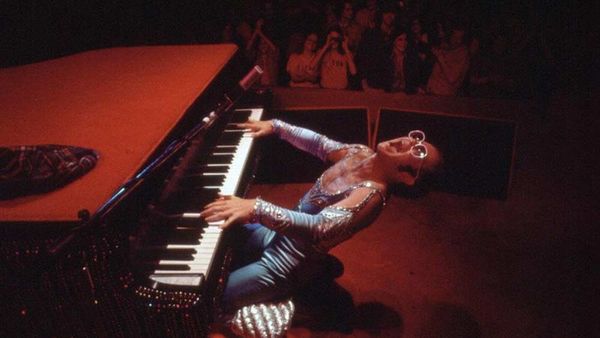November 9, 2009
The Salt Girl
Kilian Melloy READ TIME: 4 MIN.
John Kuntz writes and stars in The Salt Girl, a new one-man show directed by David Gammons, playing at the Boston Playwrights' Theatre through Nov. 22.
The play's title refers to the little girl Morton Salt canisters. She sports and umbrella and walks through a deluge, a package of salt under her arm. A trail of salt spills in her wake, despite the moisture in the air; like hansel and Gretel, the Morton's salt girl is leaving a trail behind her. The point of the illustration is to underscore the company's long-time slogan, "When it rains, it pours," meaning that despite humidity, Morton's salt won't clump up and clog in the canister's nozzle.
But for Quint, the play's main character, there's another meaning inherent in all this. He, too, is looking for a trail of some sort--a path through the woods that might lead him to his long-long older sister, who disappeared decades ago. But, as with the salt company's logo, there's a double meaning to the image of the salt girl with respect to Quint: "When it rains, it pours" is also an old adage about troubles coming not in isolated instances, but in torrents, like rain. For Quint's family--a plaything for the curious and the media--tragedy always seems to be a breath away; and one date on the calendar, April 10, seems to be the anniversary for every sort of ill and disaster.
We first meet Quint when he makes his way on stage with am umbrella over his head and a bag of groceries under his arm. The sound of rain washes over the set, with his dominated by a huge wall of shelving; twenty-six televisions, of various sizes, technical specifications, and levels of operation (two are broken) flicker with old commercials, medical films, and other images, synchronizing to Quint's narration. The story he tells is full of doublings and repeated motifs, much like the groceries he unpacks: carefully, Quit set new packages of milk, cereal, and toilet paper next to their depleted echoes.
Once he's settled, Quint chugs a handful of pills and puts his plastic shopping bag over his head: that, of course, is when the phone rings, a heavy, breathy voice announces, "I want to fuck you!," and the play is off for a hair-raising two hour jaunt through flashbacks, suspicion, terror, and reconciliations too long delayed.
Quint explains the sources of his anguish: the vanished sister, the dead mother (a possible suicide; a possible murder victim), the father who invented machines meant to kill people and who appears, drunk, in the living room during 14-year-old Quint's first sexual experience--which involves another boy.
A year later, young Quint is making a tape recording to his missing sister, describing various childhood memories that never happened; his fantasy of sharing nonexistent recollections with a missing sibling (the only claim, fictitious as it is, to family normalcy he has) is interrupted by an older man's advances. What happens next reverberates through Quint's mind for the next three decades.
The play centers around five days that play out in the wake of a car crash that leaves Quint's father near death. The crash takes place the same day of Quint's attempted suicide--April 10--and presents Quint with terrible new choices. Can he still reach his father, from whom he has been estranged for nearly twenty years? Does he want to? Does he truly believe the rumors that speculate that both his sister and his mother were the victims of his father's devices for execution?
This is a play about interruptions and unfinished business, which is as good a means to examining the chaos of life as any other. But Kuntz's script, and Gammons' set, bring a strict and maddening order to the material: like a labyrinth, Quint's narration keeps hitting walls, compelled to stop in place or take sharp turns into strange new territory, while the sheer multiplicity of televisions, lamps, and canisters of salt reflect a mind overcrowded with unending replications of the same few fears and traumas. There are haunting moments when Quint cries out to be heard--by his dying father, by anyone outside his whirling thoughts--but his words are washed out by rain and pop music from the 1980s, music that infects him as deeply and repetitiously as the images on the TV screens behind him.
All of this raises the deeply disturbing question: what can we truly say, and what can we truly hear? Beyond a handful of scarring--or transcendent--moments, is life nothing more than a maelstrom of apprehension and re-hashed memory? Kuntz strips away Quint's slight armor, his defenses, and at one point his clothing: what we find underneath everything else is a moment of usurous victimization throbbing in a space where love and family should have been. It's a throb anyone can recognize, so sharp and penetrating that it cuts a swath through storm and racket, and leaves one gasping.
Kilian Melloy serves as EDGE Media Network's Associate Arts Editor and Staff Contributor. His professional memberships include the National Lesbian & Gay Journalists Association, the Boston Online Film Critics Association, The Gay and Lesbian Entertainment Critics Association, and the Boston Theater Critics Association's Elliot Norton Awards Committee.






